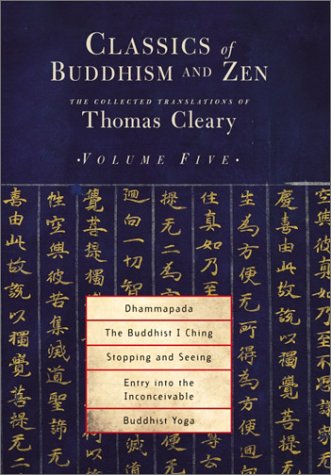
Classics of Buddhism and Zen:
The Collected Translations of Thomas Cleary
Shambhala Publications: Boston, 2001
720 pp. in 4 volumes $175.00 (cloth)
In four hardbound volumes representing twenty-two separate works, here is a handsome set of acclaimed translator Thomas Cleary’s collected Buddhist translations. The collection features teachings from the revered masters of the Ch’an (Chinese Zen) and Japanese Zen traditions, including Pai-chang, Huang-po, Dogen, and Hakuin. In addition, it includes selections from Gateless Barrier, a classic collection of Zen teaching stories, and from the “Perfection of Wisdom” sutras, a key source of the Zen tradition. The volumes are available separately or as a set.
Buddhism:
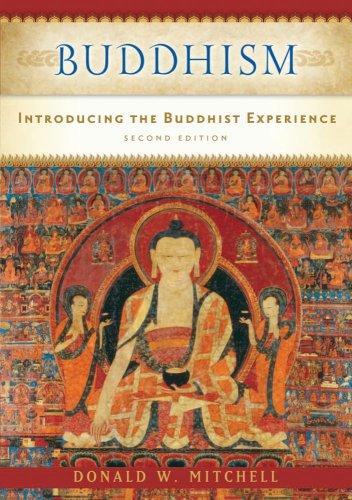
Introducing the Buddhist Experience
Donald W. Mitchell
Oxford: New York. 2002
384 pp. $55.00 (cloth), $24.95 (paper)
This broad-based book focuses on the historical and contemporary experiences of Buddhism in India, Tibet, China, Korea, Japan, and the West. Organized by geographical region, the book includes a substantial quantity of primary source material, as well as introductory chapters on fundamental beliefs. Also included are twenty-two personal narratives from such notable figures as His Holiness the Dalai Lama, Jeffrey Hopkins, Dharma Master Sheng Yen, and Robert Aitken Roshi.
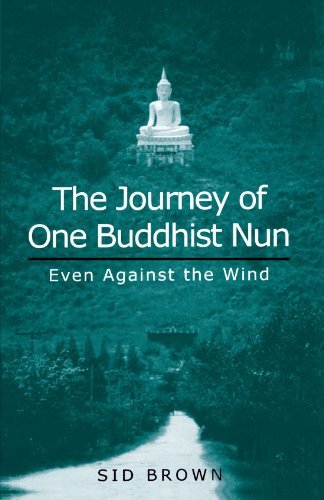
The Journey of One Buddhist Nun:
Even Against the Wind
Sid Brown
SUNY Press: New York, 2001
180 pp.; $19.95 (paper)
Sid Brown tells the story of Wabi, a Thai woman who left her rural village at age seventeen to become a Buddhist nun. Despite the obstacles of a cult Lite that scorns religious women and reveres religious men, Wabi finally found a home at a convent of Buddhist nuns. There, she was at last able to pursue her dream of a life of religious study and meditation. Told in the third person, this account includes basic Buddhist background and is useful for its insights into the place of women in modern Thai Budddhism and throughout Southeast Asia.

Jizo Bodhisattva:
Modern Healing and Traditional Buddhist Practice
Jan Chozen Bays
Tuttle: Boston. 2002
320 pp. $34.95; (cloth)
Jizo Bodhisattva is recognized throughout Asia as the Buddhist guardian of the unborn and of people who have lost loved ones. Inspired by her own experience as a pediatrician specializing in child abuse, Jan Chozen Bays, the spiritual head of Oregon’s Larch Mountain Zen Center, wrote this history and evolution of Jizo Bodhisattva to help people understand how Jizo practice can help them confront human suffering. The practice includes meditation, ceremony, prayer, and the creation of healing sanctuaries. The text is personal and approachable and accompanied by black and white photographs and illustrations.
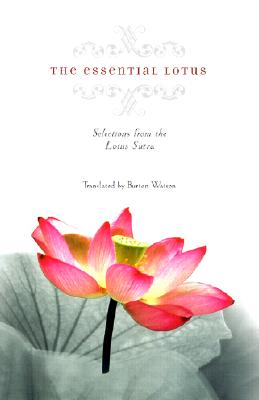
The Essential Lotus:
Selections from the Lotus Sutra
Burton Watson, trans.
Columbia University Press: New York. 2001
195 pp.; $16.95 (paper)
The Lotus Sutra is often considered the fundamental Mayahana Buddhist sutra. Attracting more commentary than any other Buddhist scripture, it has been venerated by Buddhists since its origination in third-century China. Acclaimed translator Burton Watson has abridged the sutra into its essential chapters, working from the authoritative fifth-century version by Kumarajiva (344-413), China’s most important translator of Sanskrit texts. This volume distills the voluminous sutra to the core ideas that have most influenced Buddhist and East Asian thought. The Lotus Sutra provides essential background for any study of the culture and literature of this region.
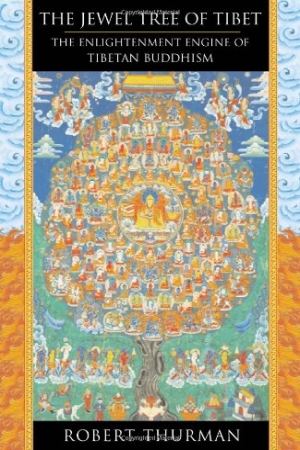
The Jewel Tree of Tibet:
Robert Thurman
Sounds True: Louisville. CO. 2001
Audio series 9 hrs 6 cassettes; $59.95
Tibetans refer to their Buddhist tradition as the “wish-fulfilling jewel tree.” The first Westerner ordained by His Holiness the Dalai Lama, scholar and teacher Robert Thurman shares the riches of this jewel tree in their original form: the spoken word. A lucid guide to the unifying principles of Tibetan Buddhism and its many branches, these lectures include discussions on the teachings of Padmasambhava, Naropa, Tsongkhapa, and other legendary sages of Tibet. In this twelve-part audio series, Thurman explores the Bodhisattva Vow, the principIes of Tantra, and “the eleven steps to create the spirit of enlightenment,” among other topics.
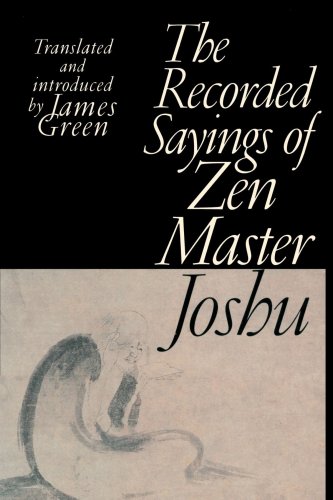
The Recorded Sayings of Zen Master Joshu:
James Green, trans.
Shambhala Publications: Boston, 2001
208 pp.: $14.95 (paper)
It is said of Joshu (Chinese: Chao-chou Ts’ung-shen), one of the great Ch’an masters of ancient China, that “his lips emitted light.” Indeed, so pithy were his verbal repartees in Zen dialogue that many of Buddhism’s best-known koans originated with his words. His spiritual and linguistic dexterity reveals the quintessential “Zen mind” and provides a catalyst for insight. Collected here is the first complete English translation of Joshu’s sayings, dialogues, and poems, in addition to accounts of his pilgrimages and a brief biography.
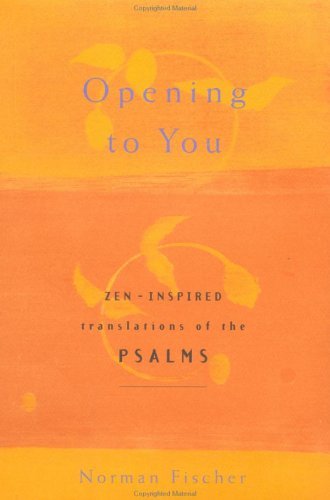
Opening to You:
Zen-Inspired Translations of the Psalms
Norman Fischer
Viking: New York, 2002
208 pp.: $19.95 (paper)
After spending a week at a Trappist abbey, Zen priest and poet Norman Fischer was so inspired by the beauty, violence, and passion of the psalms he chanted each day that he decided to “make these towering and perplexing poems accessible and beautiful in English for contemporary readers.” The book contains ninety-three poems of praise, celebration, and lamentation, rendered in a modern language that elucidates the psalms’ often opaque passages. Fisher combines Eastern and Western spirituality to unveil the mysteries of the psalms to people of any spiritual background.
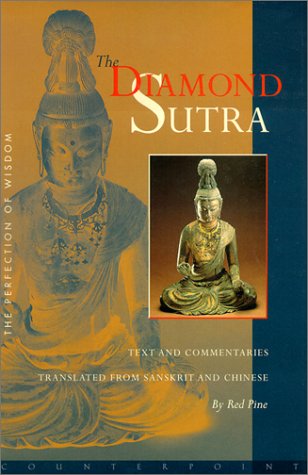
The Diamond Sutra:
The Perfection of Wisdom
Red Pine, trans.
Counterpoint: Washington, DC, 2001
480 pp.: $35.00 (cloth)
The Diamond Sutra offers a Zen teaching on the “perfection of wisdom” and, with the Lotus Sutra, is perhaps the most studied of all sutras. In this new translation, each section is followed by extensive commentary intended to present the text in a new light. Celebrated translator and scholar Red Pine remarks in his preface: “This book is the offering of no mind, born of compassion for all suffering beings. Of all the sutras that teach this teaching, this is the diamond. It cuts through all delusions, illuminates what is real, and cannot be destroyed.”
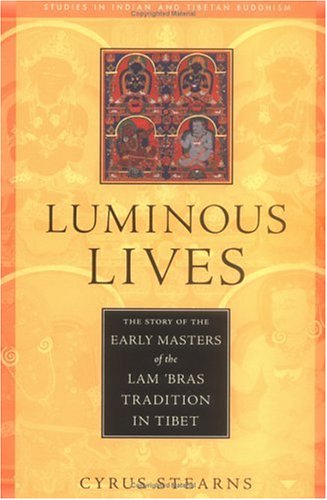
:
The Story of the Early Masters of the Lam ‘bras Tradition in Tibet
Cyrus Stearns
Wisdom: Boston, 2002
306 pp.; $3495 (cloth)
The Lam ‘bras (“Path with the Result”) tantric Buddhist tradition has been practiced in Tibet for nearly one thousand years. Cyrus Stearns, an eminent scholar of Tibetan Buddhism, presents a seminal manuscript history of its earliest practitioners and masters, during the tenth through thirteenth centuries, and a detailed description of the Lam ‘bras teachings. At the heart of the book is Stearns’s translation of a recently discovered text that records the words of the great teacher Sakya Pandita (1182-1251), featuring Tibetan and English on facing pages. This book will be of particular interest to students of the Sakyapa tradition.
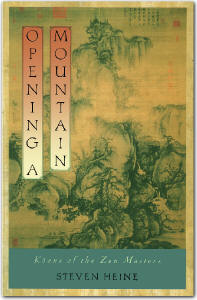
Opening a Mountain:
Koans of the Zen Masters
Steven Heine
Oxford: New York, 2002
216 pp.; $25.00 (cloth)
When Zen masters “opened a mountain,” or established a new monastery in
a remote region, they often had to contend with an array of natural and supernatural forces. From the narratives of these extraordinary experiences, called “encounter dialogues,” sprang many of Buddhism’s most popular koans. Heine here restores sixty of them to their original sources in inscrutable contests between masters, their disciples, and an array of rogue priests, wizards, shape-shifters, magical animals, and dangerous women. This new translation also reveals Chinese Zen’s adaptation of local superstitions into its own teachings.
Zen is for Everyone:
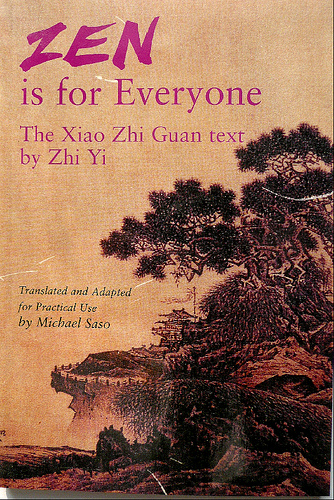
The Xiao Zhi Guan Text
by Zhi Yi, translated and adapted by Michael Saso
University of Hawaii Press: Honolulu, 2000
144 pp.; $20.00 (paper)
Popularly known as Beginner’s Zen or the Little Manllal of Shamatha-Vipashyana Meditation, this beginner’s guide to Zen has been employed by teachers and students since the sixth century. The manual is divided into ten chapters, each presenting a straightforward, explicit instruction on the path of Samatha-Vipasyana, or “Stop-Look” Zen meditation. This practice emphasizes a focus on the body’s gravity center, rather than on the heart, in order to clear the mind and awaken intuitive powers. Shamatha-Vipashyana meditation has been used by practitioners to heal illness, calm the mind, and strengthen the body.
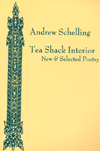
Tea Shack Interior:
New & Selected Poetry
Andrew Schelling
Talisman House: Hoboken, NJ, 2002
142 pp.; $14.95 (paper)
This book brings together Schelling’s writings from six previous volumes as well as unpublished work. Well known for his interpretations of Eastern culture and his translations from Sanskrit, Schelling imbues his poetry and prose with rough and intimate observations gleaned from his travels. “It is in the mountains the true master emerges. When tea is brewed over a cluster of twigs or a primus stove brought up the trail. The cups are chip’d enamel, the pot black with pitch smoke, water drawn from a nearby runnel … ” (from “Instructions for Tea”).
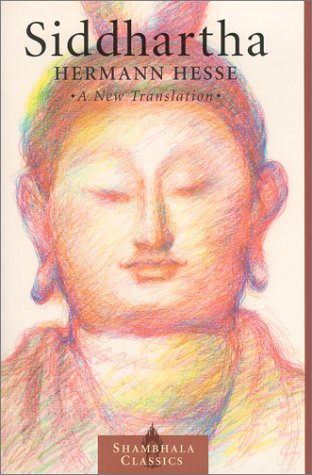
Siddhartha:
Hermann Hesse
Sherab Chadzin Kohn trans.
Sounds Tnue: Louisville, CO, 2001
Audio series: 5 hours 4 CDs; $34.95
Kohn’s new translation of this twentieth-century classic captures the spare lyricism of Hesse’s prose while placing particular emphasis onSiddhartha‘s meditative experience and the rhythms of the worlds he encounters.
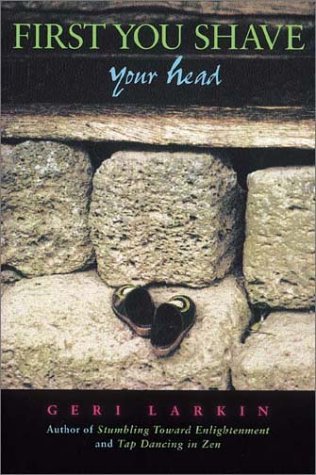
First You Shave Your Head
Geri Larkin
Ten Speed Press: Berkeley, CA, 2001
192 pages; $12.95 (paper)
When Geri Larkin is invited to join her Buddhist master on a pilgrimage to the Buddhist monasteries of South Korea, she is thrilled. But she is also nervous about the comforts she will have to relinquish and the strength she will need to shave her head and to spend thirty days carrying her master’s books up steep mountains on five hours’ sleep wearing only leather-free Keds. Here is a travelogue of new horizons, both geographic and spiritual, that celebrates the beauty of the ordinary in extraordinary circumstances.
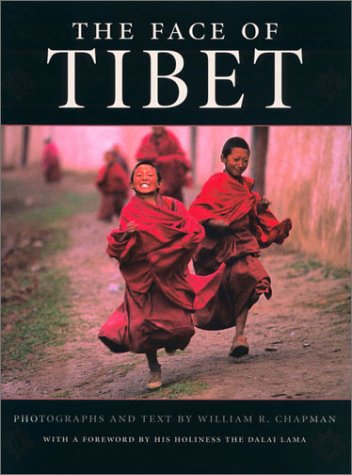
The Face of Tibet
Photographs and Text by William R. Chapman
University of Georgia Press: Athens. GA, 2001
152 pp. including 122 color photo· graphs; $45.00 (cloth)
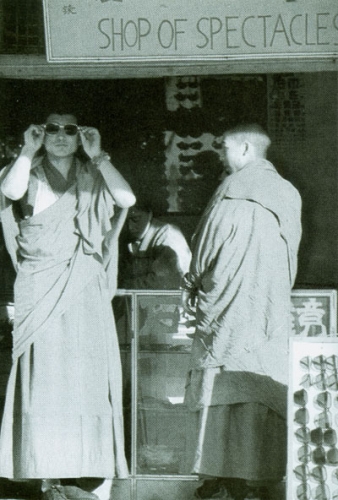
William Chapman traveled in Tibet for five years, living in monasteries, camping with nomads, and trekking the mountain ranges. This collection reveals the splendor of Tibet’s landscape and the intricacies of its daily life in portraits of the Tibetan plateau, the countryside, children, monasteries, and the forbidden city of Lhasa. In his foreword, the Dalai Lama remarks that this book “provide[s] a vivid record of life in the Land of Snow … the distress of the Chinese occupation, and Tibetans’ undiminished determination to regain what we have lost.”
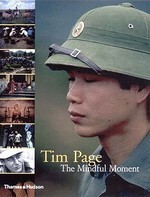
The Mindful Moment
Photographs and Text by Tim Page
Thames & Hudson: London, 2001
240 pp., including 136 photographs; $50.00 (cloth)

Legendary photographer Tim Page has been to Indochina thirty times to document its war-torn hopes, fears, and memories. For this collection, he has culled his most memorable photographs of the region, where Buddhist practices have endured the devastation of war and still guide every aspect of daily life. Presented in three parts—”Road,” “Quest,” and “Passage”—the book pairs Page’s intimate full-page photographs with personal essays that reveal the horrors and surprising revelations of life in this ancient and intensely spiritual land. ▼
Thank you for subscribing to Tricycle! As a nonprofit, we depend on readers like you to keep Buddhist teachings and practices widely available.